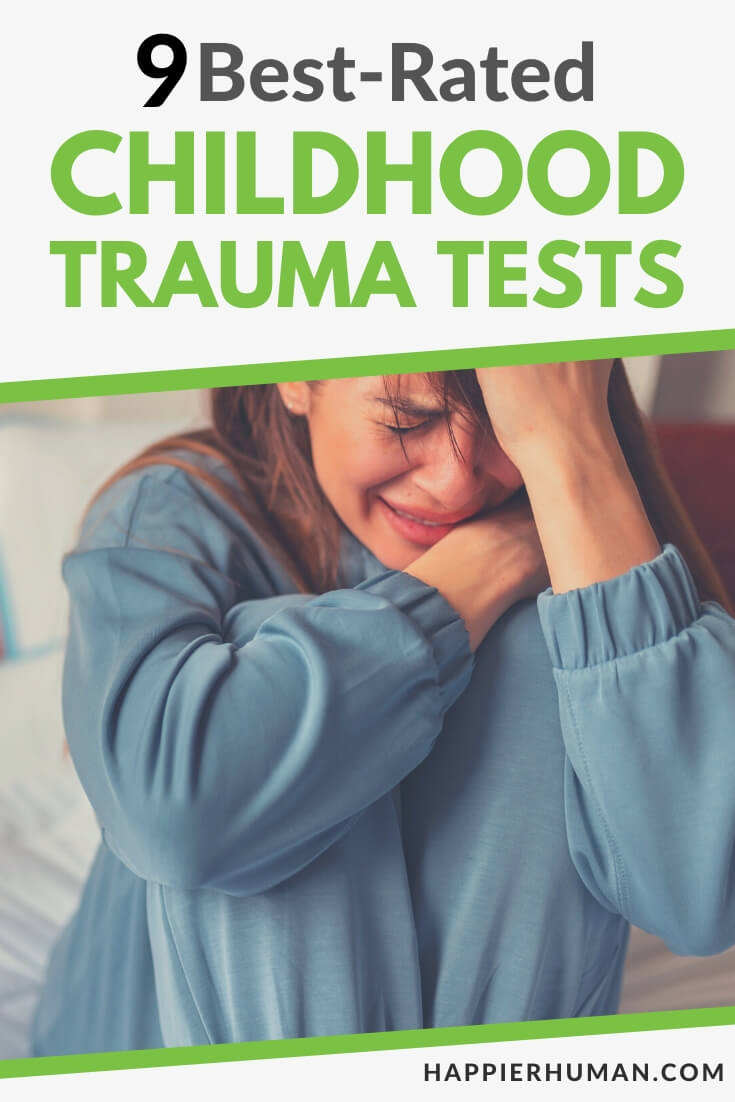Have you ever wondered how your childhood experiences have shaped your personality, behavior, and relationships?
If so, you are not alone. Many people want to learn how such experiences have impacted their current emotional and mental health.
Understanding how childhood experiences may have affected your emotional and mental health as an adult is a long journey. Fortunately, we have gathered the best-rated childhood trauma tests that can help you understand yourself better and find coping strategies for your situation.
Let’s check them out!
1. NPR: Take the ACE Quiz
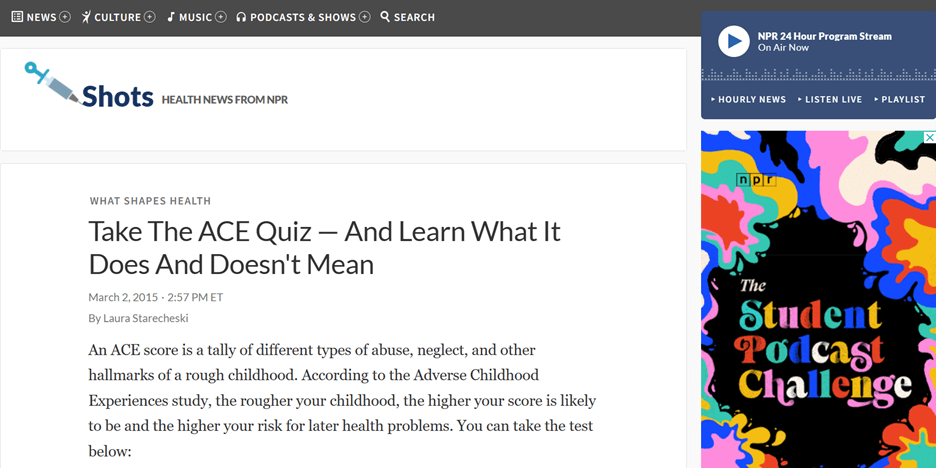
ACE stands for Adverse Childhood Experiences—it measures the amount of trauma, abuse, and neglect you experienced growing up. NPR: Take the ACE Quiz is composed of 10 questions that ask about the different types of negative experiences you may have had before you turned 18.
The higher your score is, the more likely you are to develop chronic diseases, mental health issues, and other illnesses later in life.
But worry if you turn out to have a high ACE score. This isn’t your destiny; it’s just a warning sign. There are many other factors that influence your health, such as genes, lifestyle, coping skills, and social support.
Your ACE score is simply there to help you acknowledge and heal from your past experiences and prevent future harm.
2. Psych Central: Do You Have Childhood Trauma?
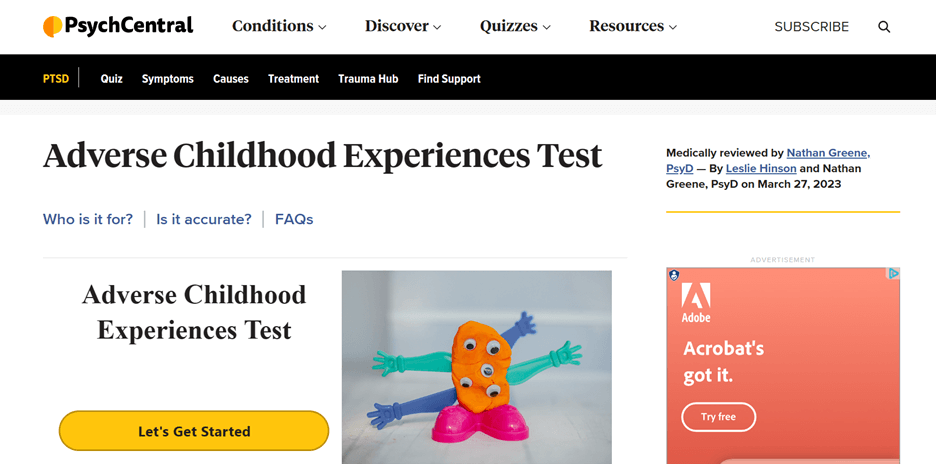
Psych Central: Do You Have Childhood Trauma? is composed of 22 questions that cover different types of adverse childhood experiences, such as abuse, neglect, violence, and loss.
Some of the questions are based on the original ACE questionnaire (see first entry). Others are based on newer measures and include other forms of trauma, like bullying, racism, and the pandemic.
The scoring system is also quite different from the original ACE questionnaire, because Psych Central’s test gives you a score for each type of trauma, as well as a total score.
While the purpose of the test is to help you understand if you have a higher risk of health problems related to childhood trauma, it is still best to consult a mental health professional who can offer more support and guidance.
3. Quizience: Childhood Trauma Test
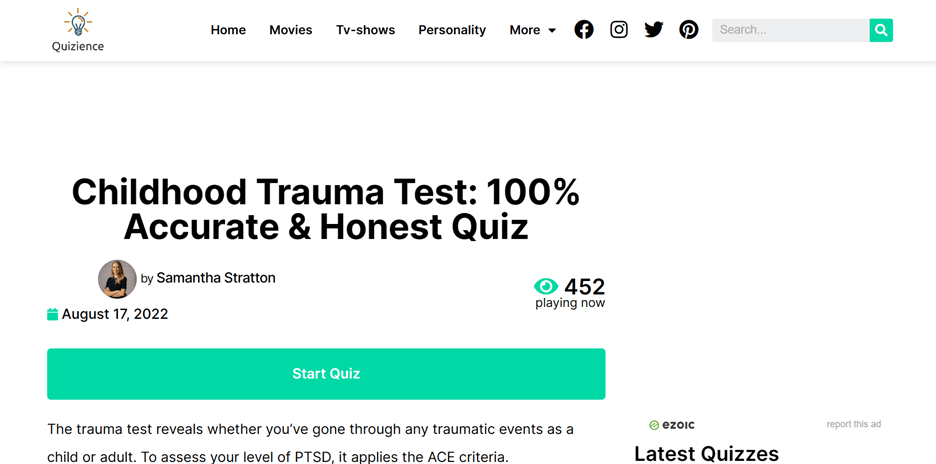
Quizience: Childhood Trauma Test is yet another tool based on the ACE criteria to measure PTSD levels among adults who had a rough childhood.
It consists of a series of psychological questions that ask about your childhood and adult challenges. It looks for signs of emotional or physical abuse, neglect from caregivers, stress, and trust issues.
As with the ACE test, do not panic if the results show that you have indeed been traumatized. It is hard to live with post-traumatic emotions, but PTSD can be treated. You can overcome your anxieties and insecurities with the right treatment plan.
4. Psych Central: Emotional Neglect Quiz
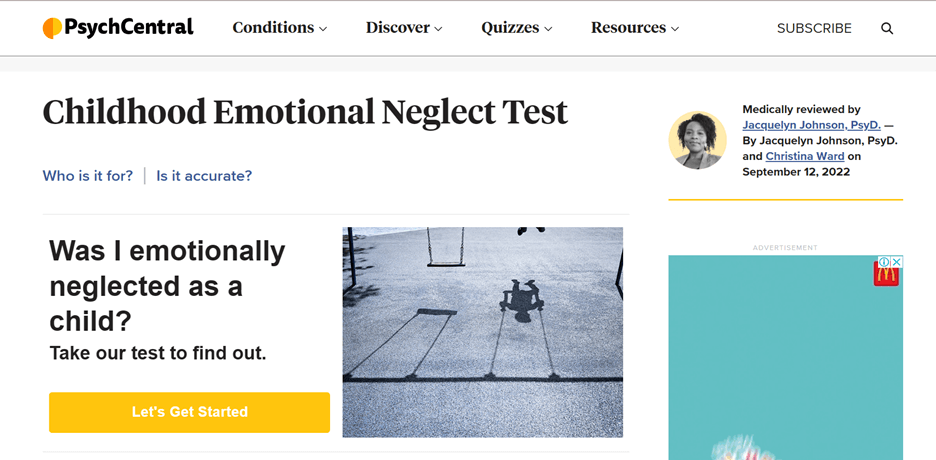
If you are struggling with intimacy and trust issues as an adult, you may have wondered if your childhood emotional neglect experiences have something to do with it.
Childhood emotional neglect happens when a parent or caregiver fails to respond to or validate your feelings. This can affect your sense of self-worth and ability to connect with others.
This Psych Central: Emotional Neglect Quiz is a way to measure your emotional neglect experiences as a child. It will ask you some questions about what it was like to live with your caregiver when you were growing up.
It is based on the Childhood Neglect Questionnaire, but should not be considered a substitute for a professional diagnosis. You may also take the quiz for someone else, but the result may not be as accurate, depending on your perception of their situation.
5. PSYEV: Childhood Trauma Test
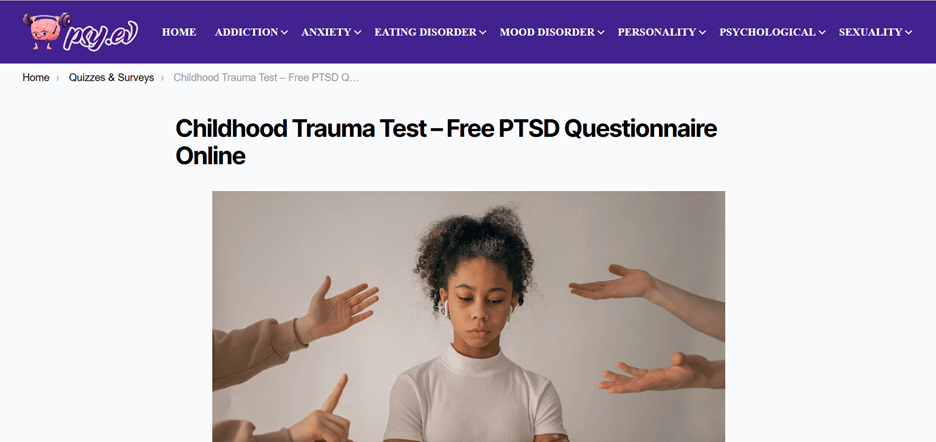
The PSYEV: Childhood Trauma Test is a self-assessment questionnaire designed to help you evaluate your mental health. It is not a substitute for a professional diagnosis, but it can give you some valuable insights into possible issues that may affect your well-being.
The test consists of 10 questions, each with four possible answers: always, often, sometimes, and rarely or never. Choose the answer that best reflects how you feel or behave.
After completing the questionnaire, click on the submit button to see your score. Your score will indicate whether you have low, moderate, or high levels of distress or anxiety.
6. PsychMechanics: Childhood Trauma Questionnaire for Adults
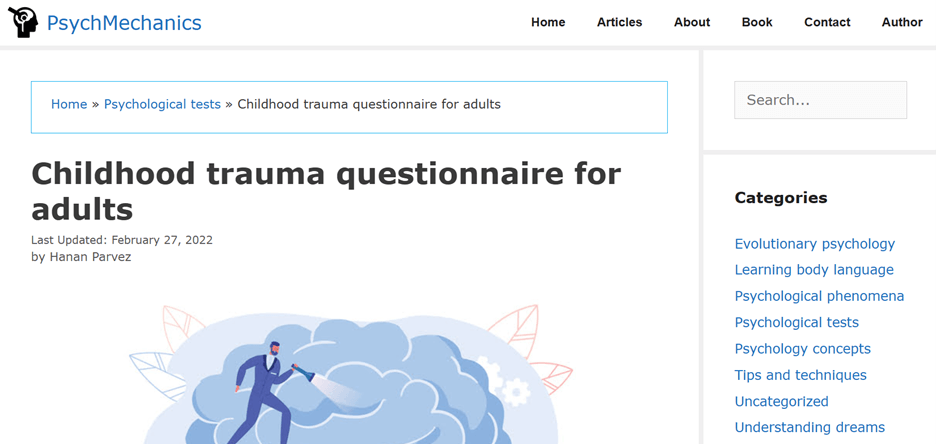
Childhood trauma can have lasting consequences on various aspects of life, such as emotional regulation, interpersonal skills, and self-esteem. This PsychMechanics: Childhood Trauma Questionnaire for Adults aims to measure the extent of these consequences.
It begins by asking you about your childhood experiences and then transitions to the current impacts of your childhood trauma.
The test is a Likert scale consisting of 18 questions. Your options may vary from strongly agree to strongly disagree, and it only takes around 2-3 minutes to complete the test.
Similar to most quizzes you will find online, your personal data is safe and your results are not saved anywhere.
7. PsychMechanics: Childhood Emotional Neglect Test
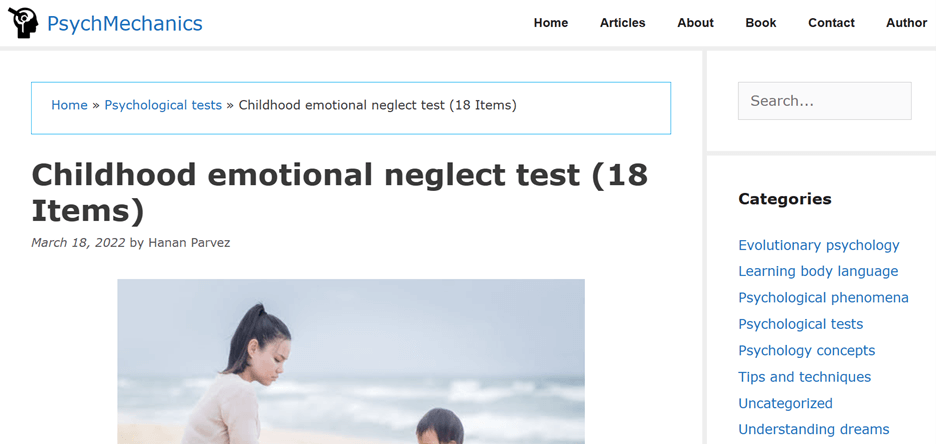
Neglect can be different from abuse, in that it may not be deliberate. Children may sometimes suffer from neglect because their parents or caregivers are going through rough times.
The PsychMechanics: Childhood Emotional Neglect Test measures emotional neglect that you may have experienced when you were younger. It consists of 18 questions that use a five-point scale ranging from strongly agree to strongly disagree.
When answering this questionnaire, you should answer based on your current feelings. The quiz measures your level of neglect related to your emotional numbness or abandonment issues.
8. Solution Tales: Childhood Trauma Quiz
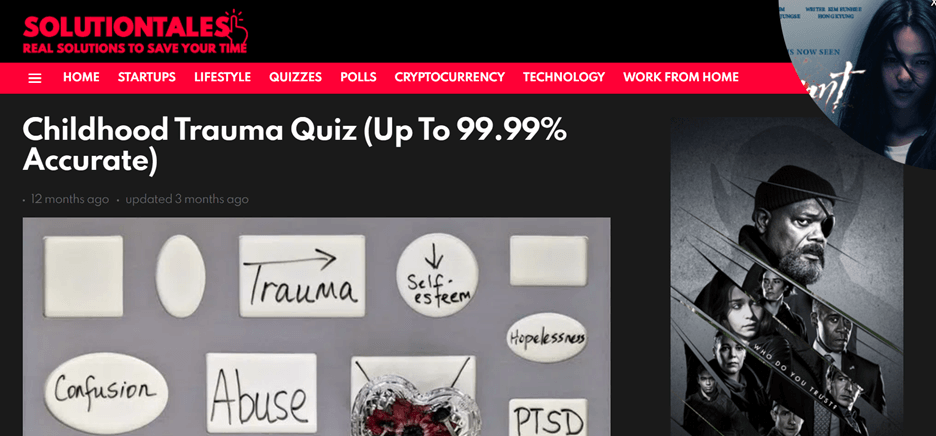
Solution Tales claims that this Childhood Trauma Quiz can help you determine whether or not you had a traumatic childhood. It cannot replace a professional diagnosis, but it may help you identify some signs and symptoms of anxiety, depression, or PTSD.
The quiz is composed of 20 questions that describe situations that may have happened to you as a child. For each question, choose one of the four options that best matches your experience.
The quiz does not give a numerical score, but it tells you whether you have signs of childhood trauma and what they mean for your well-being.
9. Quizterra: Are You Affected by Childhood Trauma?
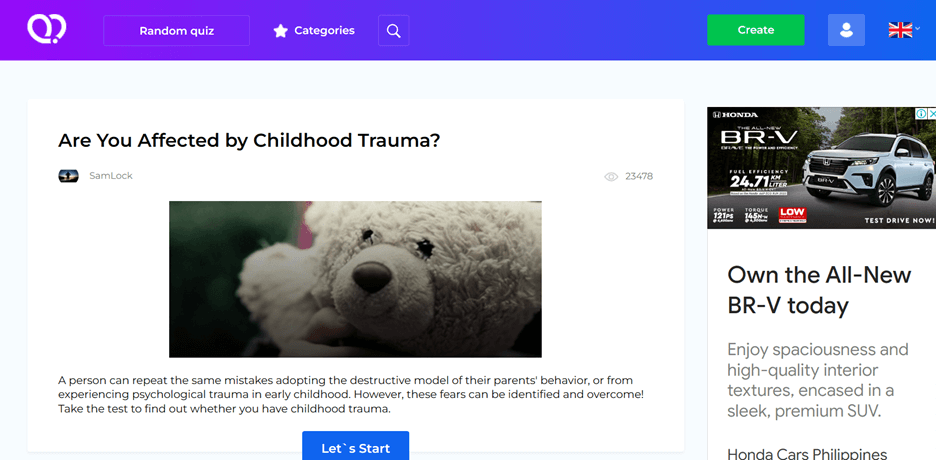
Some people unconsciously repeat the same patterns of behavior that they learned from their parents, or that resulted from psychological trauma in their early years. However, it is possible to overcome these fears by realizing where they are coming from.
This Quizterra: Are You Affected by Childhood Trauma? test consists of 10 questions that will help you reflect on your feelings and experiences. There is no numerical score, but there is a brief explanation of what your answers mean.
Final Words on Best-Rated Childhood Trauma Tests
We hope that this list of quizzes and tests about childhood trauma is useful and insightful.
Childhood trauma can have lasting effects on your mental health, but it doesn’t have to define you. You can heal and grow from your experiences, and these tests may help you start that journey.
And if you're looking for more articles about different tests, be sure to check out these blog posts:
- 7 Pathological Liar Tests: Is This Person a Compulsive Liar?
- 7 Top Highly Sensitive Tests & Quizzes
- 7 Best Online Introvert VS Extrovert Tests
